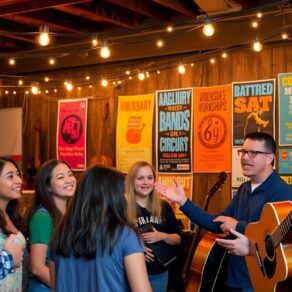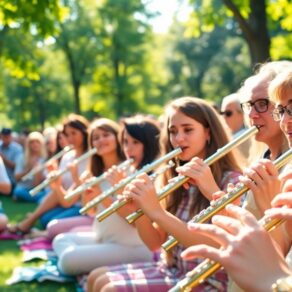To find nearby mentors in music, start by exploring local music schools; attend open houses and connect with instructors. Visit music retail stores for workshops and networking opportunities. Engage with your community by attending events and joining music festivals. Don't forget to check local bulletin boards for classes or mentorship programs. Network with fellow musicians through collaborative projects and forums. Utilize social media groups dedicated to music, where you can ask questions and connect with experienced flutists. These steps will enhance your chances of locating a mentor, and you'll discover even more valuable insights ahead.
Key Takeaways
- Attend local music events and festivals to meet experienced musicians and potential mentors in your area.
- Join community music groups or organizations to connect with like-minded individuals and explore mentorship opportunities.
- Utilize local bulletin boards to find advertisements for classes, workshops, and private lessons from experienced players.
- Engage in online flute forums and social media groups to seek advice and connect with seasoned flutists for informal mentorship.
- Participate in music workshops or open houses at local music schools to network with instructors and fellow musicians.
Explore Local Music Schools
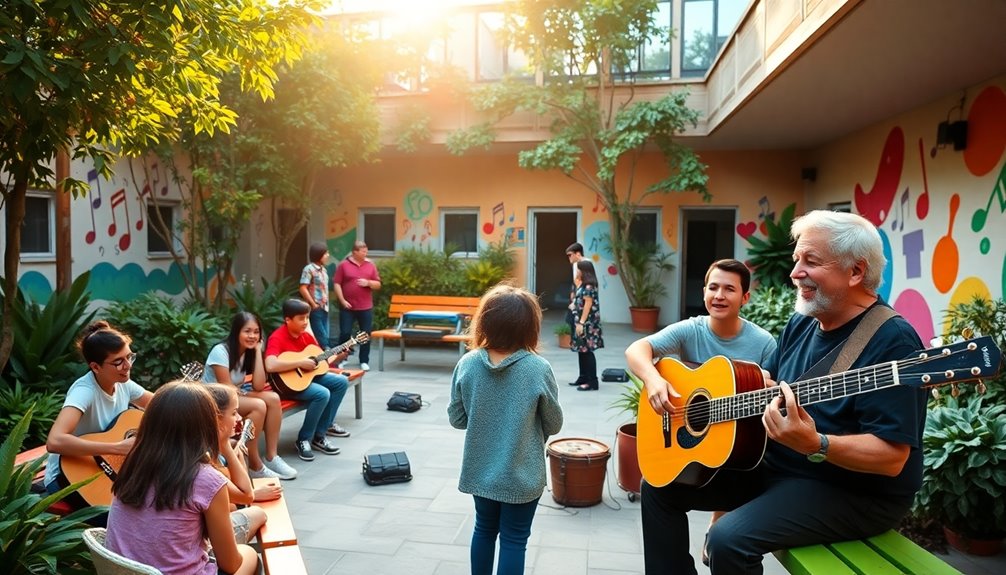
If you're looking to connect with nearby mentors, exploring local music schools can be a fantastic starting point. Music school programs often attract experienced musicians who are enthusiastic to share their knowledge and skills. By enrolling in these programs, you not only enhance your musical abilities but also open doors to invaluable mentorship opportunities.
First, research the music schools in your area. Look for programs that align with your interests, whether it's classical, jazz, or contemporary music. Once you find a few options, don't hesitate to reach out to the instructors. Many are passionate about nurturing talent and may be open to guiding you or providing additional resources.
Next, attend open houses or introductory classes. These events allow you to meet both instructors and fellow students, giving you a chance to build connections within the local music community. As you engage with others, share your goals and aspirations; you never know who might offer assistance or guidance.
Additionally, consider joining ensembles or workshops offered by these schools. Participating in group settings fosters collaboration and helps you forge relationships with mentors who can provide personalized feedback and encouragement.
Finally, be proactive in seeking mentorship. Don't be afraid to ask questions or express your interest in learning from someone more experienced. Regular interaction and participation in these environments can help you develop a strong embouchure practice, which is crucial for clear sound production. The more you engage with the music school community, the more likely you'll find mentors who resonate with your journey. Embrace these connections; they can greatly enhance your musical path.
Attend Community Events
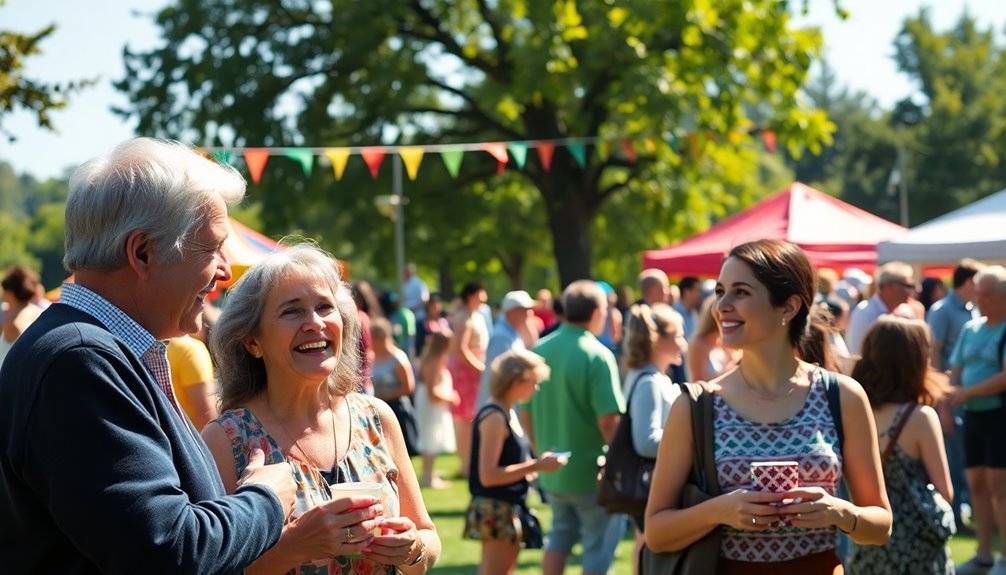
Engaging with your local music community extends beyond music schools; attending community events can greatly enrich your networking experience. These events are perfect opportunities to connect with like-minded individuals, share your passion, and discover potential mentors.
When you immerse yourself in your community, you'll find that the connections you make can lead to invaluable guidance and support.
Consider participating in:
- Community workshops that focus on various aspects of music creation and performance.
- Mentorship programs that pair you with experienced musicians who can offer insights and advice.
- Local music festivals where you can meet artists, industry professionals, and fellow enthusiasts.
By attending these events, you're not only expanding your network but also creating a sense of belonging within your community. Additionally, many community workshops offer structured lessons that can help you improve your skills.
When you're present in these settings, you'll be able to engage in conversations that spark inspiration and foster collaboration. Don't hesitate to introduce yourself and express your interests; the more you put yourself out there, the more likely you're to connect with someone who shares your passion.
Moreover, look for opportunities to volunteer at these events. Volunteering not only helps you gain experience but also allows you to meet others who are dedicated to the music scene.
Join Online Flute Forums
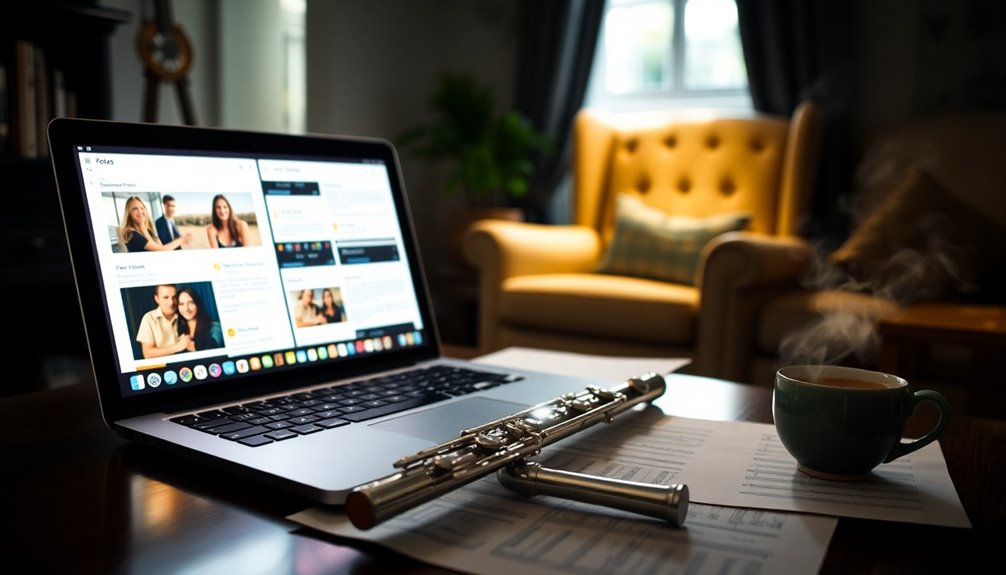
How can you enhance your flute-playing journey while connecting with fellow enthusiasts? One effective way is to join online flute forums. These platforms provide a welcoming space where you can share experiences, ask questions, and exchange valuable insights about flute techniques.
Engaging with a community of like-minded musicians not only helps you improve your skills but also fosters a sense of belonging.
In online forums, you'll find a variety of discussions ranging from beginner tips to advanced techniques. You can seek specific advice on challenges you face, whether it's mastering a tricky passage or refining your tone.
Many members are keen to share their knowledge, so don't hesitate to ask for performance feedback. Constructive criticism can be incredibly beneficial as you aim for improvement.
Additionally, participating in these forums allows you to connect with experienced flutists who can become informal mentors. They may offer guidance, resources, or even suggest local events and workshops that you mightn't have discovered otherwise.
Building relationships within these communities can lead to valuable networking opportunities. Furthermore, engaging in discussions about breathing exercises can significantly enhance your lung capacity and support while playing.
Utilize Social Media Groups
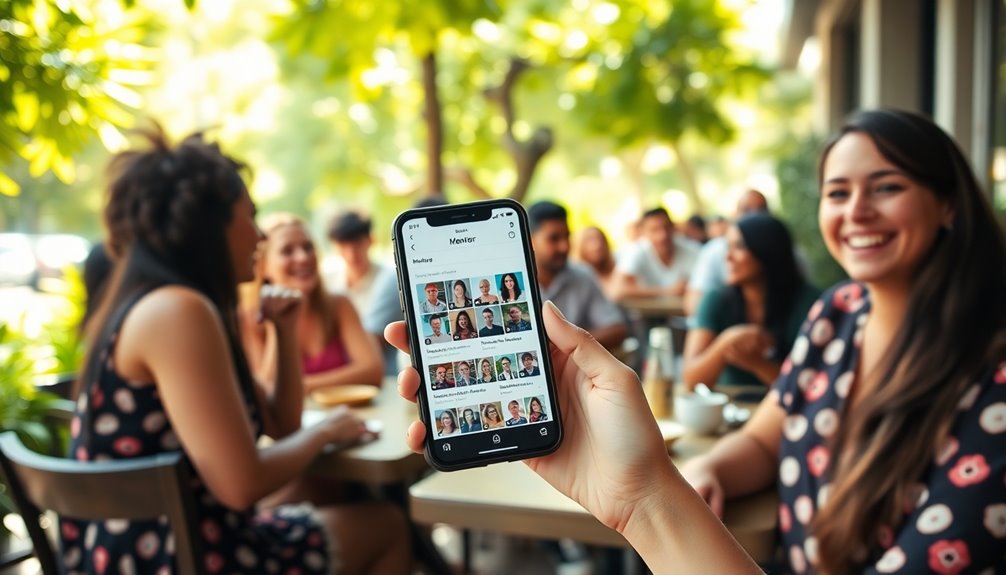
Social media groups can be a fantastic resource for connecting with fellow flute players and expanding your musical journey. These platforms offer a vibrant community where you can find mentorship opportunities, share experiences, and gain valuable insights from others who share your passion.
Here's how to make the most of these online spaces:
- Join dedicated groups: Look for groups specifically focused on flute playing or music in general. These spaces often have members at various skill levels, including seasoned pros who can offer guidance.
- Engage actively: Don't just lurk! Post questions, share your progress, and respond to others. Engaging with the community can lead to meaningful connections and potential mentorship.
- Utilize hashtags: On platforms like Instagram or Twitter, use relevant hashtags like #FluteMentorship or #FluteCommunity to find posts and individuals who could be great mentors.
When you're part of these social media groups, you create opportunities to learn and grow. Many players share insights on breath control techniques that can enhance your playing and overall performance. Reach out to those who resonate with you or have experience in areas you want to develop. Many seasoned players are enthusiastic to share their knowledge and may even be open to formal mentorship arrangements.
Network With Fellow Musicians
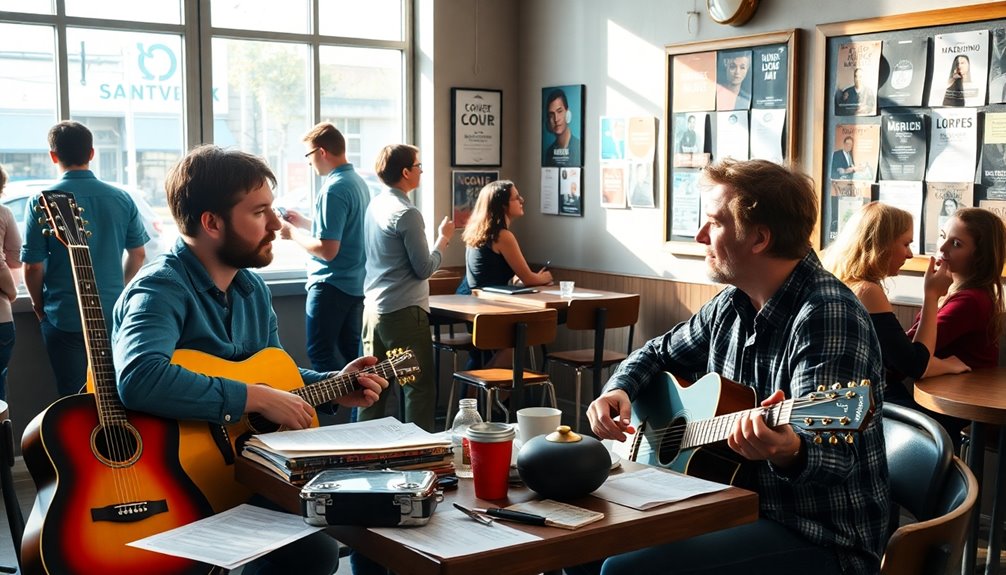
Building connections with fellow musicians can greatly enhance your journey as a flute player. Engaging with others who share your passion opens doors to new opportunities, learning experiences, and friendships that can last a lifetime.
Start by seeking out local music groups or organizations where you can meet other musicians. These gatherings often foster a sense of community, making it easier for you to connect with like-minded individuals.
Consider initiating or joining collaborative projects. Working together with other musicians not only allows you to hone your skills but also provides a platform for sharing ideas and techniques. You might discover a new approach to playing the flute or even develop a unique sound that sets you apart.
Don't overlook the value of performance workshops. These events are fantastic for networking and learning from experienced musicians. They offer a space where you can perform in front of others, receive constructive feedback, and build your confidence.
Plus, you'll likely meet potential mentors who can guide you on your musical path. When you surround yourself with fellow musicians, you create a supportive environment where you can thrive.
Each connection you make increases your chances of discovering opportunities, whether it's a new collaboration or a chance to perform. So, get out there, be open to new experiences, and embrace the camaraderie that comes with being part of a musical community.
Visit Music Retail Stores
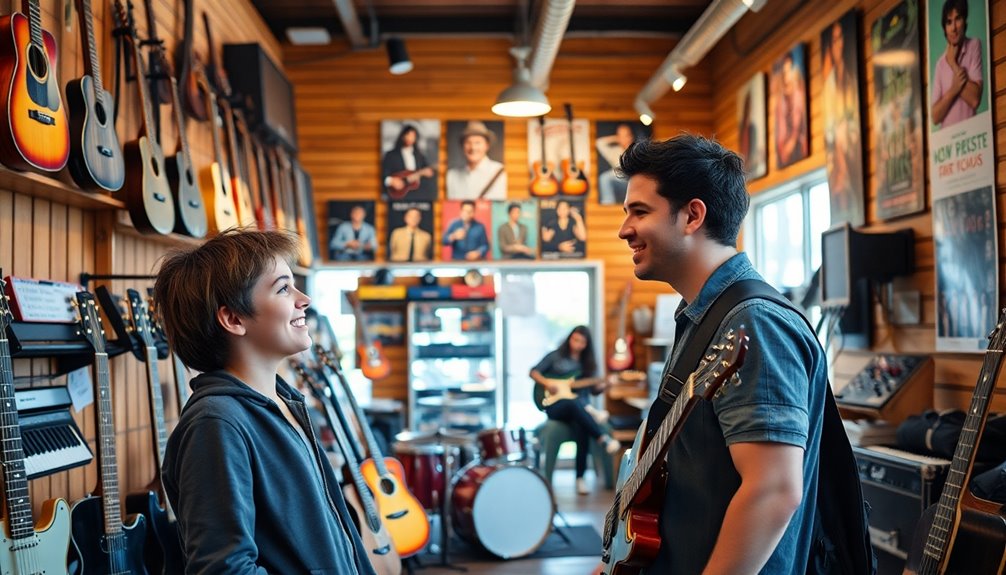
Exploring local music retail stores can be an enriching experience for any aspiring flute player. Not only do these stores offer a variety of instruments, but they also serve as hubs for musical community and mentorship. You might find that the staff are passionate musicians themselves, enthusiastic to share their knowledge and help you on your journey.
Here are a few reasons to visit your local music store:
- Instrument demonstrations: Many stores host regular demonstrations where you can see flutes in action and learn about different models and brands.
- Music workshops: Look out for workshops tailored to flute players. These sessions can provide valuable hands-on experience and introduce you to fellow flutists.
- Networking opportunities: You never know who you might meet! Local musicians often frequent these stores, making it a great place to connect with potential mentors.
When you walk into a music retail store, don't hesitate to ask questions. Staff members are often well-informed and can provide insights into flute techniques, maintenance, and even local music events. Additionally, many stores offer a selection of flute music stands that can enhance your practice experience.
Participate in workshops or events they host to foster relationships with other musicians. This sense of belonging can be incredibly motivating.
In short, visiting music retail stores isn't just about purchasing an instrument; it's about immersing yourself in a community that shares your passion. Take that first step, and you may just find the mentorship you've been looking for!
Check Local Bulletin Boards
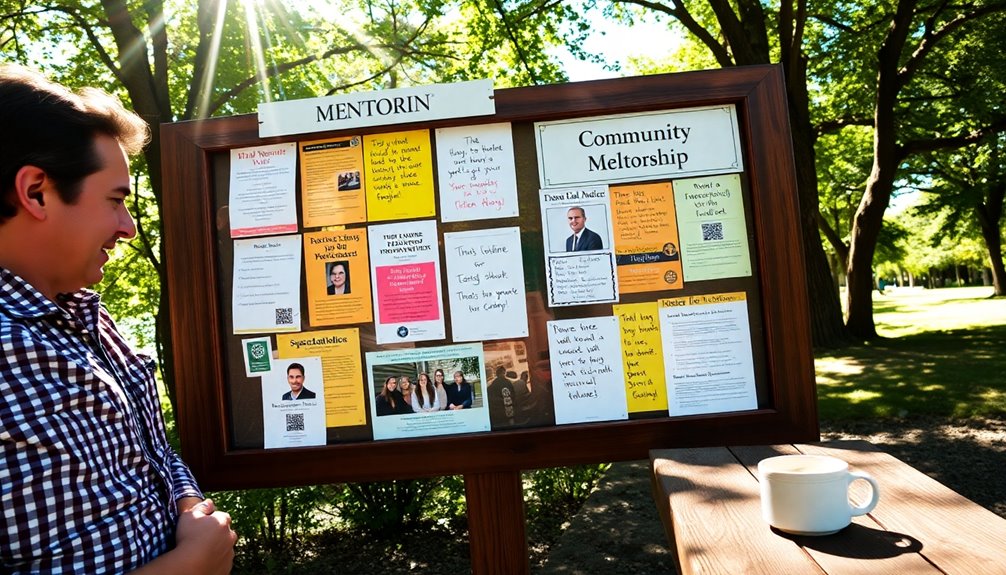
Amid the hustle and bustle of your community, local bulletin boards can be treasure troves of information for aspiring flute players seeking mentorship.
These boards come in various types, including those found in community centers, libraries, music shops, and even coffee shops. Each of these locations acts as a hub for community resources, making it easier for you to find potential mentors.
When you visit these bulletin boards, keep an eye out for flyers or announcements related to music classes, workshops, or group lessons. Often, experienced flute players or instructors will post their availability for private lessons, offering you the chance to connect directly.
Don't hesitate to approach anyone whose contact information you find; many are keen to share their knowledge and experience.
Additionally, look for local music events or jam sessions advertised on these boards. Attending these gatherings not only enhances your skills but also allows you to meet fellow musicians and potential mentors in a relaxed setting.
It's a great way to build rapport and find someone who resonates with your musical journey. Investing in cleaning and maintenance accessories can also enhance your flute playing experience, making it easier to maintain your instrument in top condition.
Remember to engage with your community; many mentors are found in unexpected places. By actively checking local bulletin boards, you open up a world of opportunities.
You might just find someone who's not only willing to guide you on your flute-playing path but also becomes a lifelong friend.
Frequently Asked Questions
How Do I Approach a Potential Mentor for the First Time?
When you make your initial contact with a potential mentor, start with a friendly introduction.
Use conversation starters like mentioning a shared interest or complimenting their work. Keep it casual and express your admiration for their accomplishments.
Ask if they'd be open to a chat over coffee or a virtual meeting.
What Qualities Should I Look for in a Mentor?
When you're searching for a mentor, think of it like finding the perfect playlist for a road trip.
Look for someone with a solid experience level in your field, as their insights will guide you through challenges.
Pay attention to their communication style—do they listen well and provide constructive feedback?
It's essential that you feel comfortable and supported, as a good mentor-mentee relationship can make all the difference in your journey.
Are There Fees Associated With Mentorship?
When considering mentorship, it's important to explore potential mentorship costs. Some mentors may charge fees, especially if they provide specialized services or coaching.
On the other hand, many mentors offer their guidance for free, valuing the relationship over financial gain. Always discuss financial considerations upfront to avoid misunderstandings.
How Long Should a Mentoring Relationship Last?
The duration of a mentoring relationship can vary, but it's helpful to set clear expectations from the start.
Typically, you might aim for a few months to a year, depending on your goals. During this time, focus on achieving mentorship milestones, like skill development or networking opportunities.
Regular check-ins can help you both assess progress and adjust the timeline as needed.
Can I Have Multiple Mentors at Once?
When it rains, it pours! Yes, you can absolutely have multiple mentors at once. Each mentor can bring unique insights and skills, enriching your mentorship dynamics.
By diversifying your mentoring relationships, you'll tap into various mentoring benefits, from career advice to personal growth. Just make sure to communicate openly with each mentor about your goals.
Balancing their guidance will help you cultivate a supportive network that fosters your sense of belonging and growth.
Conclusion
In your journey to find a mentor, think of each tip as a stepping stone across a river of opportunity. By exploring local music schools, attending community events, and engaging with fellow musicians, you're not just seeking guidance; you're weaving a tapestry of connections that enriches your musical path. Each conversation and experience adds a thread to your growing network. So, embrace these steps with an open heart, and watch as the right mentor emerges from the currents of your efforts.



